牛津译林版(2019)选择性必修 第一册Unit 4 Exploring poetry Welcome to the unit & Reading 课件(共36张PPT)
文档属性
| 名称 | 牛津译林版(2019)选择性必修 第一册Unit 4 Exploring poetry Welcome to the unit & Reading 课件(共36张PPT) |
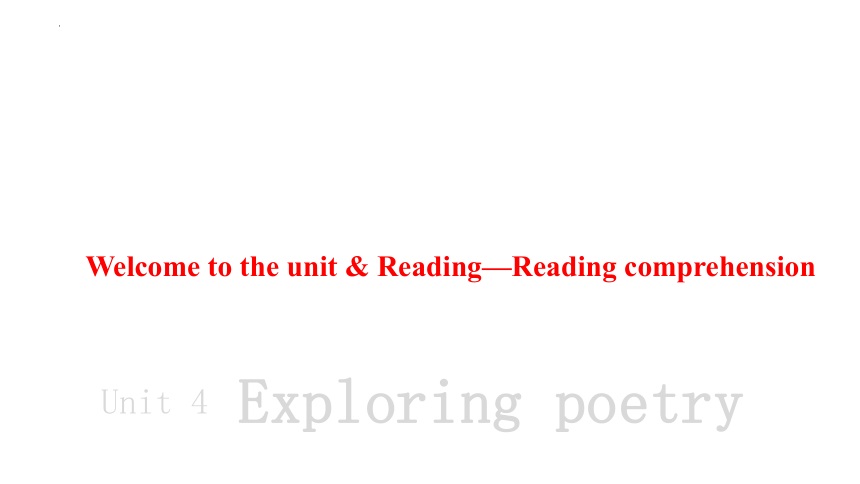
|
|
| 格式 | pptx | ||
| 文件大小 | 17.3MB | ||
| 资源类型 | 教案 | ||
| 版本资源 | 牛津译林版(2019) | ||
| 科目 | 英语 | ||
| 更新时间 | 2024-04-01 21:30:34 | ||
图片预览

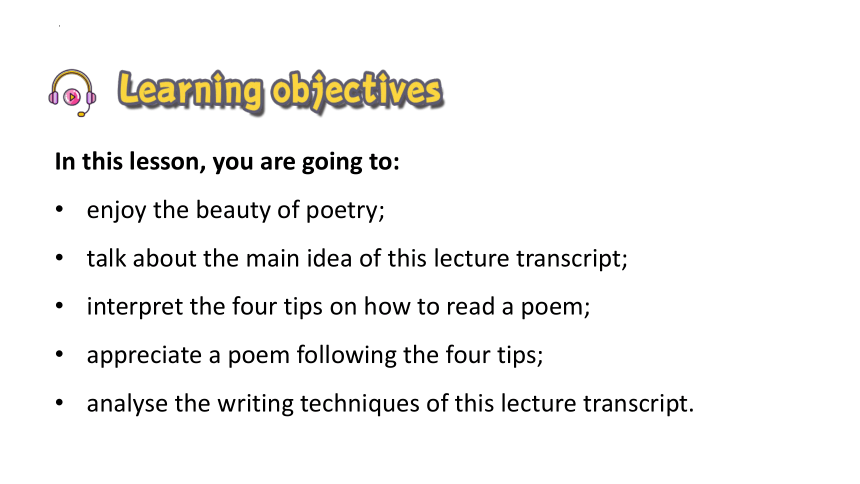
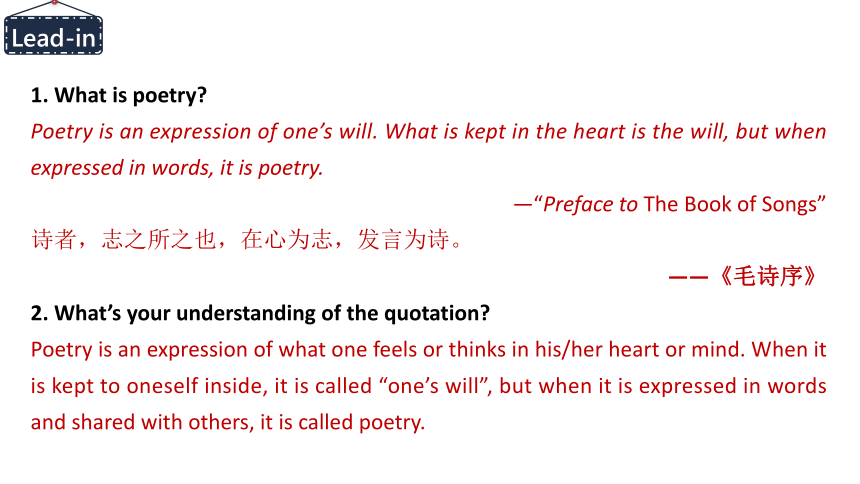
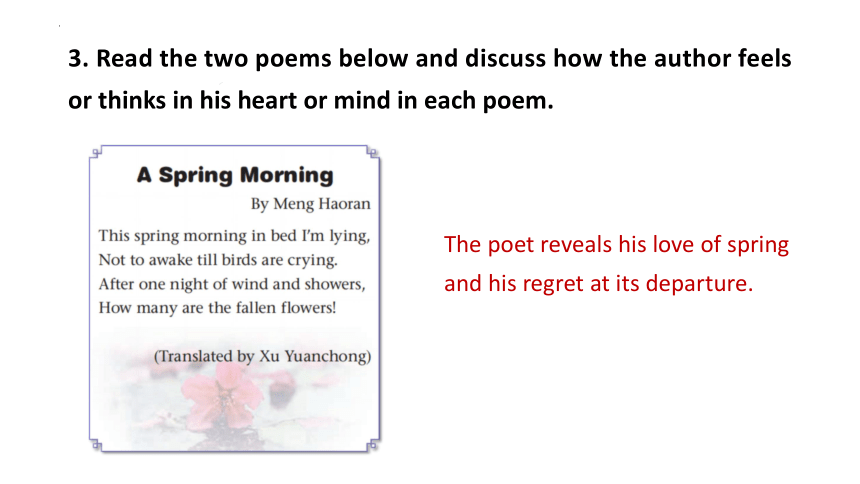
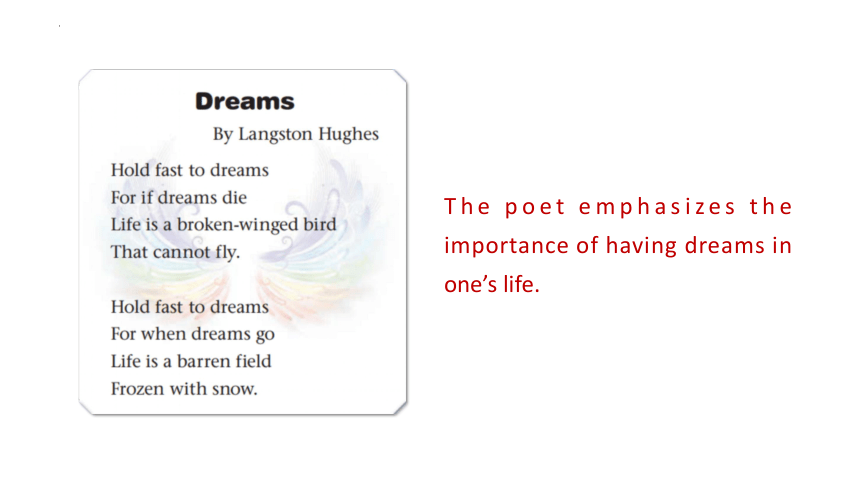
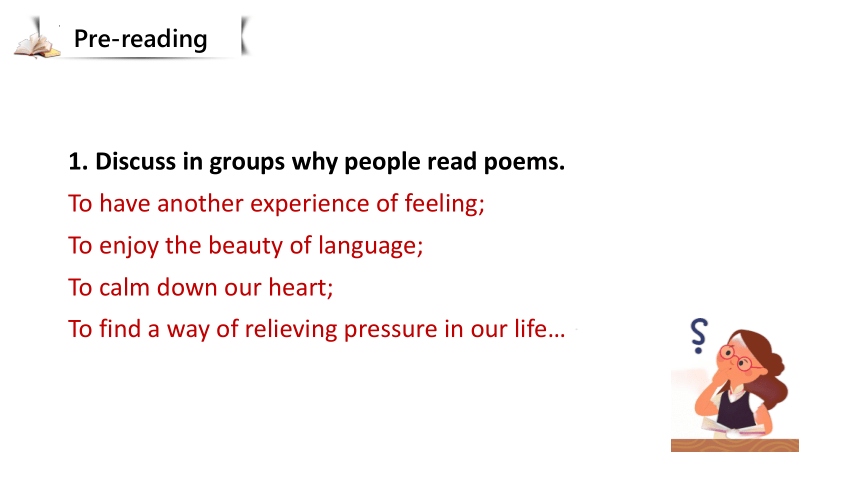
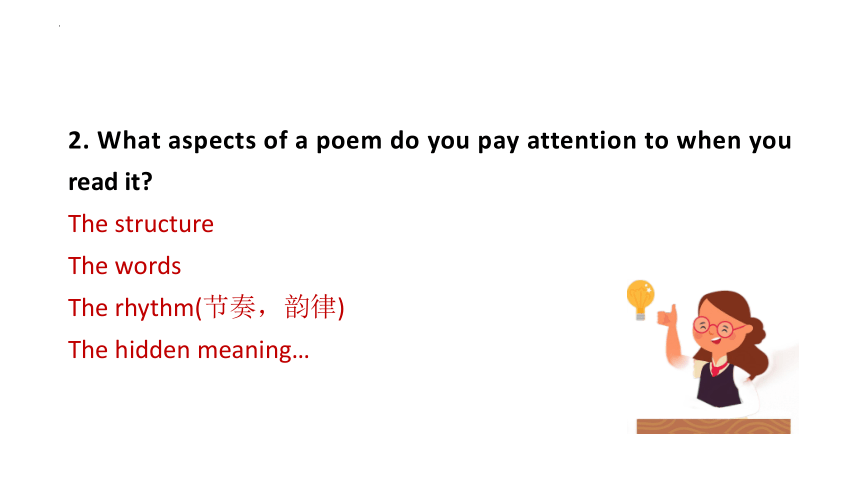
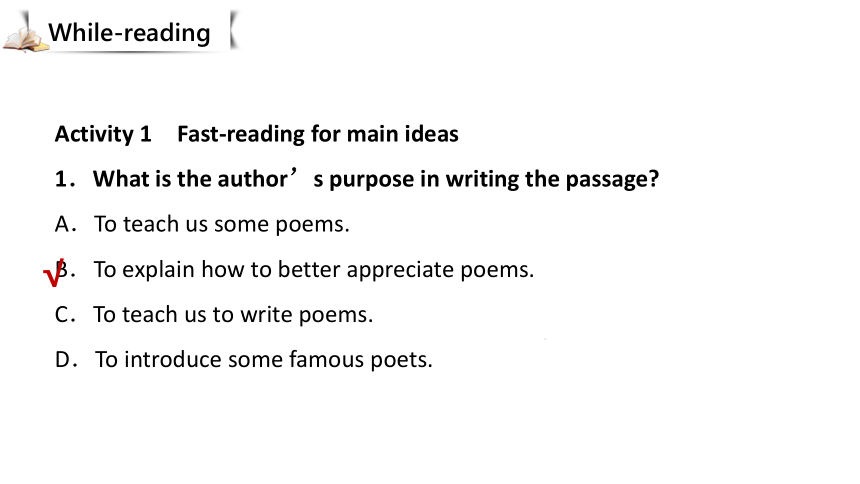
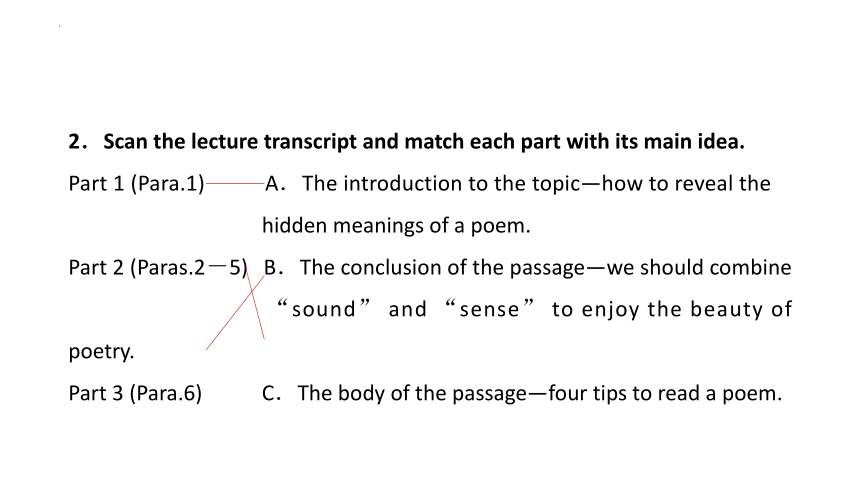
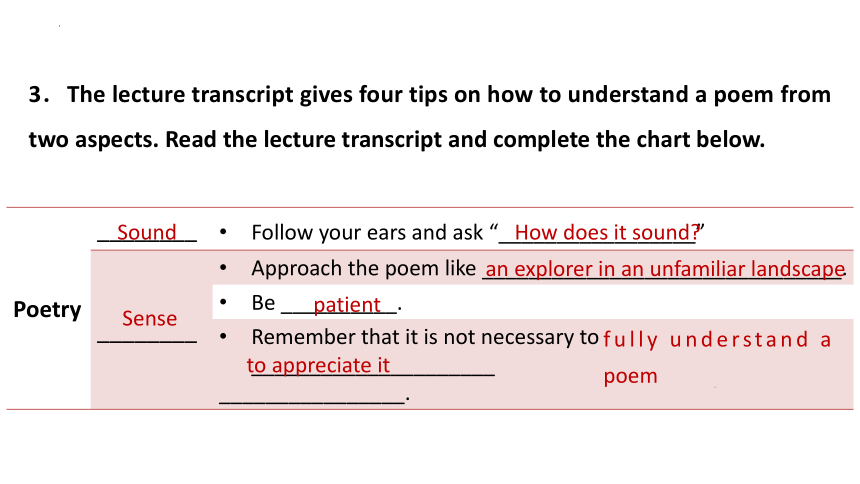
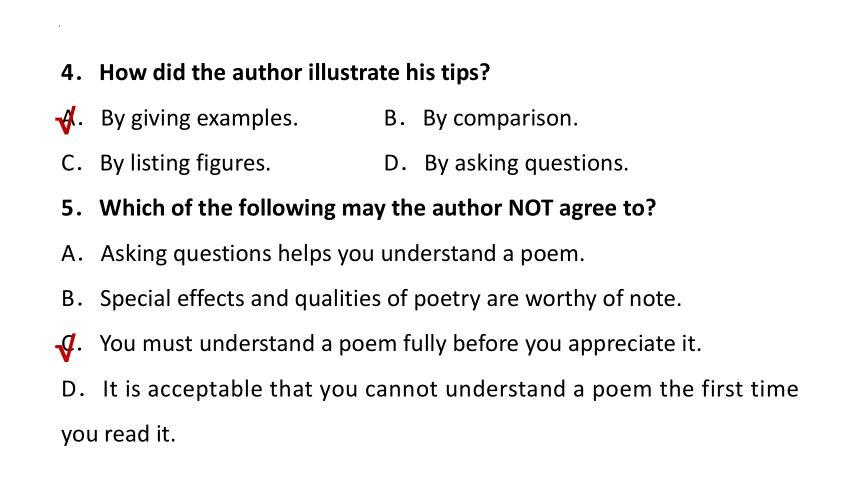

文档简介
(共36张PPT)
Welcome to the unit & Reading—Reading comprehension
Unit 4
Exploring poetry
In this lesson, you are going to:
enjoy the beauty of poetry;
talk about the main idea of this lecture transcript;
interpret the four tips on how to read a poem;
appreciate a poem following the four tips;
analyse the writing techniques of this lecture transcript.
1. What is poetry
Poetry is an expression of one’s will. What is kept in the heart is the will, but when expressed in words, it is poetry.
—“Preface to The Book of Songs”
诗者,志之所之也,在心为志,发言为诗。
——《毛诗序》
2. What’s your understanding of the quotation
Poetry is an expression of what one feels or thinks in his/her heart or mind. When it is kept to oneself inside, it is called “one’s will”, but when it is expressed in words and shared with others, it is called poetry.
Lead-in
3. Read the two poems below and discuss how the author feels or thinks in his heart or mind in each poem.
The poet reveals his love of spring and his regret at its departure.
The poet emphasizes the importance of having dreams in one’s life.
Pre-reading
1. Discuss in groups why people read poems.
To have another experience of feeling;
To enjoy the beauty of language;
To calm down our heart;
To find a way of relieving pressure in our life…
2. What aspects of a poem do you pay attention to when you read it
The structure
The words
The rhythm(节奏,韵律)
The hidden meaning…
While-reading
Activity 1 Fast-reading for main ideas
1.What is the author’s purpose in writing the passage
A.To teach us some poems.
B.To explain how to better appreciate poems.
C.To teach us to write poems.
D.To introduce some famous poets.
√
2.Scan the lecture transcript and match each part with its main idea.
Part 1 (Para.1) A.The introduction to the topic—how to reveal the hidden meanings of a poem.
Part 2 (Paras.2-5) B.The conclusion of the passage—we should combine “sound” and “sense” to enjoy the beauty of poetry.
Part 3 (Para.6) C.The body of the passage—four tips to read a poem.
Poetry ________ Follow your ears and ask “_________________”
________ Approach the poem like _______________________________.
Be __________.
Remember that it is not necessary to _____________________
________________.
Sound
Sense
How does it sound
an explorer in an unfamiliar landscape
patient
fully understand a poem
3.The lecture transcript gives four tips on how to understand a poem from two aspects. Read the lecture transcript and complete the chart below.
to appreciate it
4.How did the author illustrate his tips
A.By giving examples. B.By comparison.
C.By listing figures. D.By asking questions.
5.Which of the following may the author NOT agree to
A.Asking questions helps you understand a poem.
B.Special effects and qualities of poetry are worthy of note.
C.You must understand a poem fully before you appreciate it.
D.It is acceptable that you cannot understand a poem the first time you read it.
√
√
Activity 2 Careful-reading for details
Ⅰ. Read paragraph 1 carefully and choose the best answer.
What makes poetry unique compared to other types of literature
A.It sounds more interesting.
B.It is easier for us to understand when we read it aloud.
C.There are more repeated words and rhymes in it.
D.It usually implies a deeper meaning beyond the words on the page.
√
Ⅱ.Read paragraph 2 carefully and do the following exercises.
1.What does “follow your ears” mean
It means you should read a poem aloud.Because you can always say something about how the poem sounds when you read it aloud,even if its true meaning appears to be beyond your grasp.
Sweet and low, sweet and low,
Wind of the western sea,
Low, low, breathe and blow,
Wind of the western sea!
Over the rolling waters go,
Come from the dying moon, and blow,
Blow him again to me;
While my little one, while my pretty one, sleeps.
Are repeated
Rhyming words
Rhyming words
2.(1)Read Alfred Tennyson’s poem aloud and use the tip in paragraph 2 to analyze its sound characteristics.
(2)How do you feel when you read it aloud
(Answers may vary.)It is easy to read and sounds beautiful.
Alfred, Lord Tennyson
(1809–1892)
More than any other Victorian-era writer, Tennyson has seemed the representative of his age. In his own day he was said to be—with Queen Victoria and Prime Minister William Gladstone—one of the three most famous living persons, a reputation no other poet writing in English has ever had.
Ⅲ. Read paragraph 3 carefully and do the following exercises.
1.Finish the chart.
Approach the poem as if you were an (1)________ in an unfamiliar (2)_________.
As you approach the poem,you should ask: (3)__________________________________________________________________________________________________________________________________
As you explore the poem,you should ask: (4)_____________________________________________________________
As you slowly explore your surroundings,you will: Start to (5)____________ that give you a greater (6)_____________ of the poem.
explorer
landscape
Who is talking Who is being talked to What is being described Is there a sense of place Are there other people or objects there?
What are the images What happens when they are put together?
dig up clues
understanding
2.What will come into your mind when you explore a poem with some questions in mind
A.Images. B.Repeated words.
C.Rhymes. D.Its meaning.
3.When you are reading Caged Bird,what image comes into your mind
A.A bird flying happily in the sky.
B.A bird set free by a hunter.
C.A bird in a cage singing for freedom.
D.A bird living happily in its nest.
√
√
Maya Angelou
(1928-2014)
An acclaimed American poet, storyteller, activist, and autobiographer.
Angelou worked for Dr. Martin Luther King Jr. and was also an educator who served as a professor in the university.
Ⅳ. Read paragraph 4 carefully and do the following exercises.
1.How do you deal with it when you have difficulty understanding a poem
A.Ask others for help.
B.Give up reading it.
C.Put it aside and read it later.
D.Keep reading it until you fully understand it.
√
2.What does the author think of poems that are easy to understand
Poems that are easy to understand are often less interesting than those that constantly reveal deeper and previously unrecognized meanings.
3.(1)What did the tired traveler walk past
A.A sea. B.A desert. C.A forest. D.A hill.
(2)Did he want to leave
A.Yes. B.No.
(3)The tired traveler didn’t want to leave because of ________________________.His poem shows the contradictory thought between the dream and ___________.It shows the poet’s thought of life and society.
the beauty of the forest
the reality
√
√
Robert Frost
(1874-1963)
An American poet who was much admired for his description of the rural life of New England, and his realistic verse portraying ordinary people in everyday situations. His famous poems include: Stopping by Woods on a Snowy Evening and The Road Not Taken.
Ⅴ. Read paragraph 5 carefully and do the following exercises.
1.What is more important when you appreciate a poem
A.Fully understanding it.
B.Abandoning logical thinking.
C.Discovering its true inner beauty.
D.Reading it as much as possible.
2.How can you know that your effort will pay off
As long as the journey of poetry reading makes us feel something or lets us perceive another level of meaning,it will have been worth our effort.
√
Ⅵ. Read paragraph 6 carefully and answer the following question.
What will poetry bring for us
Poetry’s combination of “sound” and “sense” will make us see the world in a new way and allow us to go beyond normal reality for the everlasting beauty.
Activity 1 Discussion
1. Is the last paragraph a good ending Why or why not (Critical thinking)
The last paragraph is a good ending. At the beginning of the lecture, the speaker points out that poetry is a combination of “sound” and “sense”. The last paragraph echoes(呼应) the beginning by mentioning it again, which makes the lecture more coherent(连贯的).
Post-reading
2. Apart from the four tips given by the lecturer, what other tips can you give on how to read a poem (Creative thinking)
From my point of view, to understand a poem better, we should also know more about the poet and the background in which the poem was created—the theme of a poem usually has a close relationship with the background in which the poet wrote it.
主题升华
We don’t read and write poetry because it’s cute. We read and write poetry because we are members of the human race and the human race is filled with passion. Medicine, law, business, engineering—these are noble pursuits and necessary to sustain life, but poetry, beauty, romance, love—these are what we stay alive for.
Activity 2 Summary
Poetry is a combination of “sound” and“sense”,which usually 1._______(imply)a deeper meaning beyond the words.Here are some ways for you to reveal its 2.______(hide)dimension.Firstly,follow your ears.When you begin reading a poem,it is better 3.______(ask)“How does it sound?” You can always say something about how the poem sounds when 4._______(read)it aloud.Secondly,approach the poem like 5.__ explorer in an unfamiliar landscape.As you explore the poem,you will begin to see images in your mind.
implies
hidden
to ask
reading
an
As you slowly explore your surroundings,you will start to dig up 6._____(clue)that give you a greater understanding of the poem.Thirdly,just have some 7.________(patient).You cannot really understand a poem 8.__________ you have only read once.Sometimes reading a poem can be a lifelong job.Finally,keep in mind that you do not have to 9._____(full)understand a poem to appreciate it.You might need to abandon logical thinking to discover its true inner beauty.Poetry’s combination of “sound” and “sense” makes you see the world in a new way and allows you to go 10.______ normal reality for the everlasting beauty.
clues
patience
that/which
fully
beyond
First, follow your ears. While you may ask “What does it mean ” as you begin reading a poem, it is better to ask “How does it sound ” Even if its true meaning appears to be beyond your grasp, you can always say something about how the poem sounds when you read it aloud. Do you detect a rhythm Are there any repeated words, rhymes or other special effects All of these are good qualities to notice, and they may lead you to a better understanding of the poem in the end. Read these lines to feel how they sound.
while引导让步状语从句
as引导时间状语从句
even if引导让步状语从句
how引导宾语从句
when引导时间状语从句
Analyze the key points of the text
Paragraph 2
Second, approach the poem as if you were an explorer in an unfamiliar landscape. Ask some basic questions about the poem. Who is talking Who is being talked to What is being described Is there a sense of place Are there other people or objects there As you explore the poem, you will begin to see images in your mind. What are those images, and what happens when they are put together This combination is often complex or even contradictory. As you slowly explore your surroundings, you will start to dig up clues that give you a greater understanding of the poem. Read these lines, pay attention to the image of the caged bird and try to find out what it means.
as if 引导方式状语从句, 使用了虚拟语气
as引导时间状语从句
as引导时间状语从句
that引导定语从句
what引导宾语从句
Paragraph 3
Third, if you are still struggling to interpret the meaning of a poem even with much painstaking effort, just have some patience. You cannot really understand a poem that you have only read once. Sometimes reading a poem can be a lifelong job. So if you do not get it, set the poem aside and come back to it later. As an explorer, you will not reach your goal immediately — you need to go on a journey to a remote and unknown destination. This may seem difficult at first, but when you finally make your great discovery, your efforts will be rewarded. Poems that are easy to understand are often less interesting than those that constantly reveal deeper and previously unrecognized meanings. Read these lines and try to find out what they mean.
定语从句
定语从句
定语从句
宾语从句
Paragraph 4
Finally, remember that you do not have to fully understand a poem to appreciate it. You might need to abandon logical thinking to discover its true inner beauty. As long as the journey of poetry reading makes you feel something or lets you perceive another level of meaning, it will have been worth your effort.
宾语从句
as long as引导条件状语从句,意为“只要”
Paragraph 5
Homework
Preview language points and recite the key points of the text.
Welcome to the unit & Reading—Reading comprehension
Unit 4
Exploring poetry
In this lesson, you are going to:
enjoy the beauty of poetry;
talk about the main idea of this lecture transcript;
interpret the four tips on how to read a poem;
appreciate a poem following the four tips;
analyse the writing techniques of this lecture transcript.
1. What is poetry
Poetry is an expression of one’s will. What is kept in the heart is the will, but when expressed in words, it is poetry.
—“Preface to The Book of Songs”
诗者,志之所之也,在心为志,发言为诗。
——《毛诗序》
2. What’s your understanding of the quotation
Poetry is an expression of what one feels or thinks in his/her heart or mind. When it is kept to oneself inside, it is called “one’s will”, but when it is expressed in words and shared with others, it is called poetry.
Lead-in
3. Read the two poems below and discuss how the author feels or thinks in his heart or mind in each poem.
The poet reveals his love of spring and his regret at its departure.
The poet emphasizes the importance of having dreams in one’s life.
Pre-reading
1. Discuss in groups why people read poems.
To have another experience of feeling;
To enjoy the beauty of language;
To calm down our heart;
To find a way of relieving pressure in our life…
2. What aspects of a poem do you pay attention to when you read it
The structure
The words
The rhythm(节奏,韵律)
The hidden meaning…
While-reading
Activity 1 Fast-reading for main ideas
1.What is the author’s purpose in writing the passage
A.To teach us some poems.
B.To explain how to better appreciate poems.
C.To teach us to write poems.
D.To introduce some famous poets.
√
2.Scan the lecture transcript and match each part with its main idea.
Part 1 (Para.1) A.The introduction to the topic—how to reveal the hidden meanings of a poem.
Part 2 (Paras.2-5) B.The conclusion of the passage—we should combine “sound” and “sense” to enjoy the beauty of poetry.
Part 3 (Para.6) C.The body of the passage—four tips to read a poem.
Poetry ________ Follow your ears and ask “_________________”
________ Approach the poem like _______________________________.
Be __________.
Remember that it is not necessary to _____________________
________________.
Sound
Sense
How does it sound
an explorer in an unfamiliar landscape
patient
fully understand a poem
3.The lecture transcript gives four tips on how to understand a poem from two aspects. Read the lecture transcript and complete the chart below.
to appreciate it
4.How did the author illustrate his tips
A.By giving examples. B.By comparison.
C.By listing figures. D.By asking questions.
5.Which of the following may the author NOT agree to
A.Asking questions helps you understand a poem.
B.Special effects and qualities of poetry are worthy of note.
C.You must understand a poem fully before you appreciate it.
D.It is acceptable that you cannot understand a poem the first time you read it.
√
√
Activity 2 Careful-reading for details
Ⅰ. Read paragraph 1 carefully and choose the best answer.
What makes poetry unique compared to other types of literature
A.It sounds more interesting.
B.It is easier for us to understand when we read it aloud.
C.There are more repeated words and rhymes in it.
D.It usually implies a deeper meaning beyond the words on the page.
√
Ⅱ.Read paragraph 2 carefully and do the following exercises.
1.What does “follow your ears” mean
It means you should read a poem aloud.Because you can always say something about how the poem sounds when you read it aloud,even if its true meaning appears to be beyond your grasp.
Sweet and low, sweet and low,
Wind of the western sea,
Low, low, breathe and blow,
Wind of the western sea!
Over the rolling waters go,
Come from the dying moon, and blow,
Blow him again to me;
While my little one, while my pretty one, sleeps.
Are repeated
Rhyming words
Rhyming words
2.(1)Read Alfred Tennyson’s poem aloud and use the tip in paragraph 2 to analyze its sound characteristics.
(2)How do you feel when you read it aloud
(Answers may vary.)It is easy to read and sounds beautiful.
Alfred, Lord Tennyson
(1809–1892)
More than any other Victorian-era writer, Tennyson has seemed the representative of his age. In his own day he was said to be—with Queen Victoria and Prime Minister William Gladstone—one of the three most famous living persons, a reputation no other poet writing in English has ever had.
Ⅲ. Read paragraph 3 carefully and do the following exercises.
1.Finish the chart.
Approach the poem as if you were an (1)________ in an unfamiliar (2)_________.
As you approach the poem,you should ask: (3)__________________________________________________________________________________________________________________________________
As you explore the poem,you should ask: (4)_____________________________________________________________
As you slowly explore your surroundings,you will: Start to (5)____________ that give you a greater (6)_____________ of the poem.
explorer
landscape
Who is talking Who is being talked to What is being described Is there a sense of place Are there other people or objects there?
What are the images What happens when they are put together?
dig up clues
understanding
2.What will come into your mind when you explore a poem with some questions in mind
A.Images. B.Repeated words.
C.Rhymes. D.Its meaning.
3.When you are reading Caged Bird,what image comes into your mind
A.A bird flying happily in the sky.
B.A bird set free by a hunter.
C.A bird in a cage singing for freedom.
D.A bird living happily in its nest.
√
√
Maya Angelou
(1928-2014)
An acclaimed American poet, storyteller, activist, and autobiographer.
Angelou worked for Dr. Martin Luther King Jr. and was also an educator who served as a professor in the university.
Ⅳ. Read paragraph 4 carefully and do the following exercises.
1.How do you deal with it when you have difficulty understanding a poem
A.Ask others for help.
B.Give up reading it.
C.Put it aside and read it later.
D.Keep reading it until you fully understand it.
√
2.What does the author think of poems that are easy to understand
Poems that are easy to understand are often less interesting than those that constantly reveal deeper and previously unrecognized meanings.
3.(1)What did the tired traveler walk past
A.A sea. B.A desert. C.A forest. D.A hill.
(2)Did he want to leave
A.Yes. B.No.
(3)The tired traveler didn’t want to leave because of ________________________.His poem shows the contradictory thought between the dream and ___________.It shows the poet’s thought of life and society.
the beauty of the forest
the reality
√
√
Robert Frost
(1874-1963)
An American poet who was much admired for his description of the rural life of New England, and his realistic verse portraying ordinary people in everyday situations. His famous poems include: Stopping by Woods on a Snowy Evening and The Road Not Taken.
Ⅴ. Read paragraph 5 carefully and do the following exercises.
1.What is more important when you appreciate a poem
A.Fully understanding it.
B.Abandoning logical thinking.
C.Discovering its true inner beauty.
D.Reading it as much as possible.
2.How can you know that your effort will pay off
As long as the journey of poetry reading makes us feel something or lets us perceive another level of meaning,it will have been worth our effort.
√
Ⅵ. Read paragraph 6 carefully and answer the following question.
What will poetry bring for us
Poetry’s combination of “sound” and “sense” will make us see the world in a new way and allow us to go beyond normal reality for the everlasting beauty.
Activity 1 Discussion
1. Is the last paragraph a good ending Why or why not (Critical thinking)
The last paragraph is a good ending. At the beginning of the lecture, the speaker points out that poetry is a combination of “sound” and “sense”. The last paragraph echoes(呼应) the beginning by mentioning it again, which makes the lecture more coherent(连贯的).
Post-reading
2. Apart from the four tips given by the lecturer, what other tips can you give on how to read a poem (Creative thinking)
From my point of view, to understand a poem better, we should also know more about the poet and the background in which the poem was created—the theme of a poem usually has a close relationship with the background in which the poet wrote it.
主题升华
We don’t read and write poetry because it’s cute. We read and write poetry because we are members of the human race and the human race is filled with passion. Medicine, law, business, engineering—these are noble pursuits and necessary to sustain life, but poetry, beauty, romance, love—these are what we stay alive for.
Activity 2 Summary
Poetry is a combination of “sound” and“sense”,which usually 1._______(imply)a deeper meaning beyond the words.Here are some ways for you to reveal its 2.______(hide)dimension.Firstly,follow your ears.When you begin reading a poem,it is better 3.______(ask)“How does it sound?” You can always say something about how the poem sounds when 4._______(read)it aloud.Secondly,approach the poem like 5.__ explorer in an unfamiliar landscape.As you explore the poem,you will begin to see images in your mind.
implies
hidden
to ask
reading
an
As you slowly explore your surroundings,you will start to dig up 6._____(clue)that give you a greater understanding of the poem.Thirdly,just have some 7.________(patient).You cannot really understand a poem 8.__________ you have only read once.Sometimes reading a poem can be a lifelong job.Finally,keep in mind that you do not have to 9._____(full)understand a poem to appreciate it.You might need to abandon logical thinking to discover its true inner beauty.Poetry’s combination of “sound” and “sense” makes you see the world in a new way and allows you to go 10.______ normal reality for the everlasting beauty.
clues
patience
that/which
fully
beyond
First, follow your ears. While you may ask “What does it mean ” as you begin reading a poem, it is better to ask “How does it sound ” Even if its true meaning appears to be beyond your grasp, you can always say something about how the poem sounds when you read it aloud. Do you detect a rhythm Are there any repeated words, rhymes or other special effects All of these are good qualities to notice, and they may lead you to a better understanding of the poem in the end. Read these lines to feel how they sound.
while引导让步状语从句
as引导时间状语从句
even if引导让步状语从句
how引导宾语从句
when引导时间状语从句
Analyze the key points of the text
Paragraph 2
Second, approach the poem as if you were an explorer in an unfamiliar landscape. Ask some basic questions about the poem. Who is talking Who is being talked to What is being described Is there a sense of place Are there other people or objects there As you explore the poem, you will begin to see images in your mind. What are those images, and what happens when they are put together This combination is often complex or even contradictory. As you slowly explore your surroundings, you will start to dig up clues that give you a greater understanding of the poem. Read these lines, pay attention to the image of the caged bird and try to find out what it means.
as if 引导方式状语从句, 使用了虚拟语气
as引导时间状语从句
as引导时间状语从句
that引导定语从句
what引导宾语从句
Paragraph 3
Third, if you are still struggling to interpret the meaning of a poem even with much painstaking effort, just have some patience. You cannot really understand a poem that you have only read once. Sometimes reading a poem can be a lifelong job. So if you do not get it, set the poem aside and come back to it later. As an explorer, you will not reach your goal immediately — you need to go on a journey to a remote and unknown destination. This may seem difficult at first, but when you finally make your great discovery, your efforts will be rewarded. Poems that are easy to understand are often less interesting than those that constantly reveal deeper and previously unrecognized meanings. Read these lines and try to find out what they mean.
定语从句
定语从句
定语从句
宾语从句
Paragraph 4
Finally, remember that you do not have to fully understand a poem to appreciate it. You might need to abandon logical thinking to discover its true inner beauty. As long as the journey of poetry reading makes you feel something or lets you perceive another level of meaning, it will have been worth your effort.
宾语从句
as long as引导条件状语从句,意为“只要”
Paragraph 5
Homework
Preview language points and recite the key points of the text.
同课章节目录
- Unit 1 Food matters
- Welcome to the unit
- Reading
- Grammar and usage
- Integrated skills
- Extended reading
- Project
- Unit 2 The Universal Language
- Welcome to the unit
- Reading
- Grammar and usage
- Integrated skills
- Extended reading
- Project
- Unit 3 The art of painting
- Welcome to the unit
- Reading
- Grammar and usage
- Integrated skills
- Extended reading
- Project
- Unit 4 Exploring poetry
- Welcome to the unit
- Reading
- Grammar and usage
- Integrated skills
- Extended reading
- Project
